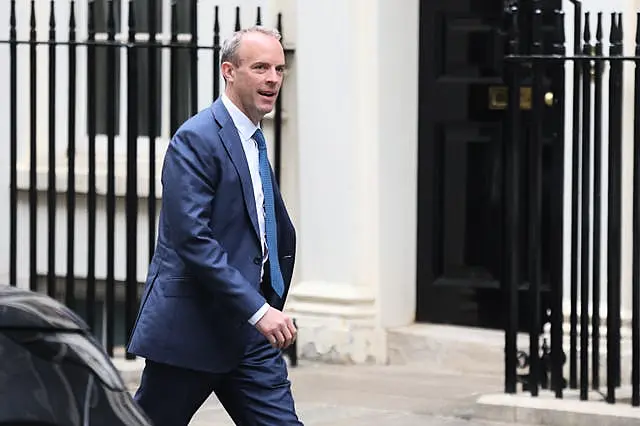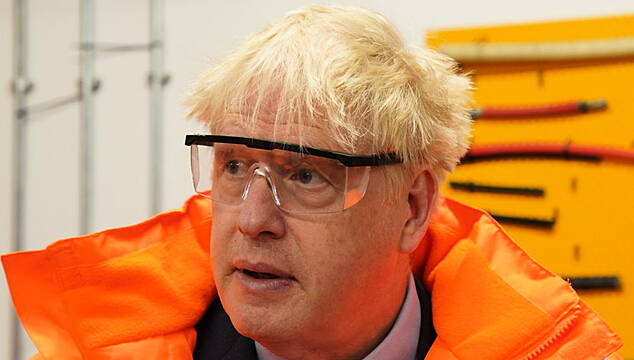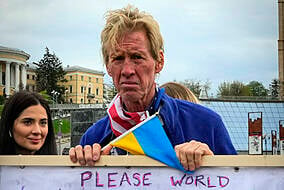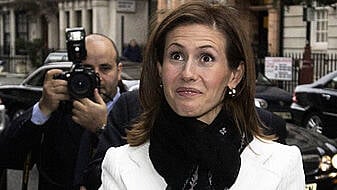Boris Johnson has claimed quitting as UK prime minister over the “miserable” partygate scandal would be irresponsible.
He cited “huge pressures” on the economy, the war in Ukraine and his “massive agenda which I was elected to deliver” as his reasons for remaining in post and not seeking to “abandon” ship.
But Mr Johnson is under increasing pressure from Tory MPs to consider his position in the wake of Sue Gray’s report on lockdown parties in Downing Street.
His own ethics adviser also criticised his handling of partygate, with Lord Geidt suggesting Mr Johnson’s fixed penalty notice (FPN) may have breached the ministerial code.
Lord Geidt, the independent adviser on the ministerial code, said a “legitimate question” had arisen as to whether the FPN, issued for a June 2020 birthday party thrown in Mr Johnson’s honour in the Cabinet Room, might have constituted a breach of the “overarching duty within the ministerial code of complying with the law”.

Deputy UK prime minister Dominic Raab led the counter-attack on Wednesday by insisting questions around whether Mr Johnson broke the rules for ministers “have been answered”, as he backed the prime minister’s assertion that he did not intend to breach Covid laws.
The British justice secretary said he does not believe the prime minister will face a confidence vote next week, as the prospect of a leadership challenge loomed.
He said speculation over the matter is “yet more Westminster talking to itself” and thinks “the vast majority of MPs respect, recognise and agree with that”.
Mr Johnson, in an interview with Mumsnet released on Wednesday, repeated his apology for the events in Downing Street when told a teacher would have lost their job if they had broken the law and asked why the same did not apply to him.

He said: “If people look at the event in question it felt to me like a work event, I was there for a very short period of time in the Cabinet Office at my desk and, you know, I was very, very surprised and taken aback to get an FPN but of course I paid it.
“I think that on why am I still here, I’m still here because we’ve got huge pressures economically, we’ve got to get on, you know, we’ve got the biggest war in Europe for 80 years, and we’ve got a massive agenda to deliver which I was elected to deliver.
“I’ve thought about all these questions a lot, as you can imagine, and I just cannot see how actually it’d be responsible right now – given everything that is going on simply to abandon a) the project which I embarked on but b)…”
At this point, Mr Johnson was interrupted and told some believe he has lost the trust of the people, to which the prime minister replied: “Let’s see about that and, yeah, I’m not going to deny the whole thing hasn’t been a totally miserable experience for people in Government and we’ve got to learn from it and understand the mistakes we made and we’ve got to move forward.”
Sir Geoffrey Clifton-Brown, treasurer of the backbench 1922 Committee, said Conservative MPs need to consider which “crimes” Mr Johnson has “actually committed” before launching a leadership coup.
Mr Clifton-Brown told BBC Radio 4’s Today programme he wants Mr Johnson to stay in position as “a man who knows how to handle crises”, citing his response to the war in Ukraine and the rising cost of living.
However, he added that “the situation is changing on a daily basis”.

Amid suggestions Lord Geidt was considering his position over the handling of the issue, the Cabinet Office insisted he is not quitting.
Labour’s shadow communities secretary Lisa Nandy, speaking at her party’s by-election campaign launch in Wakefield, said: “This is just a damning indictment of the Prime Minister’s leadership that successive ethics advisers just feel that they can’t trust the integrity of the Prime Minister.
“This is a Government that is rotten to the core, that the rot starts from the top.”
There is a growing belief in Westminster that it is only a matter of time before the 54 letters from Conservative MPs needed to trigger a confidence vote are submitted to the chairman of the 1922 Committee, Sir Graham Brady.
So far, more than 25 MPs have publicly called on the prime minister to stand down – although not all of them have said whether they have written to Mr Brady.







